God in the Whedonverse: Faith, Hope, and Truth

Let’s take a moment to talk about God. Don’t worry – no pamphlets or early morning doorstep visits. Let’s discuss God in the context of vampire slayers, mind-wiping technology, and space cowboys. Joss Whedon, creator of cult television series Buffy the Vampire Slayer and Firefly, has had a complicated relationship with religion. When asked “Is there a God?” in a 2002 A.V. Club interview, he replied, “No.” Alright, so maybe not entirely complicated. However, the portrayals of faith (no, not the Eliza Dushku kind) on his shows have been incredibly multifaceted for such a staunch atheist. This makes sense – many atheists spend a great deal of time exploring God and religion in search of a conclusion. For Whedon, this exploration comes in the form of the stories he tells. So how does the big guy upstairs factor into some of Whedon’s hit shows?
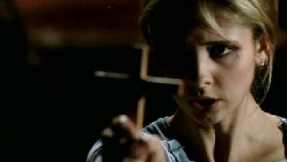
In describing the premise of Buffy the Vampire Slayer, English Watcher and librarian Rupert Giles explains it best: “Into every generation, there is a chosen one. She alone will stand against the vampires, the demons, and the forces of darkness. She is the Slayer.” Throughout her battles against these evil forces, Buffy Summers serves as the ultimate agent of good. But is she an agent of God? Sure, the action heroine comes equipped with a cross necklace and a few vials of holy water to ward off vampires, but the existence of God in the Buffyverse remains ambiguous. The lore of the series retains the classical use of these apotropaics without ever mentioning the Judeo-Christian God.
Buffy does spend a summer-long stint in heaven after sacrificing herself for her sister, Dawn, as well as the rest of the world. In describing this sacred place, she says, “Wherever I was, I was happy. At peace. I knew that everyone I cared about was all right. I knew it. Time didn’t mean anything, nothing had form…but I was still me, you know? And I was warm and I was loved… and I was finished. Complete. I don’t understand about dimensions or theology or any of…but I think I was in heaven.” Here, Buffy speaks of an idea of eternal bliss and fulfillment similar to that of the Bible. Entrance into the Christian heaven is determined by full-fledged acceptance of the Lord into one’s heart. Meanwhile, Buffy’s beliefs on God before she enters heaven are unknown. She also never mentions meeting God when she enters heaven. What seems to grant this slayer access into the Buffyverse heaven is the selfless, almost Christ-like sacrifice she makes to save the world.
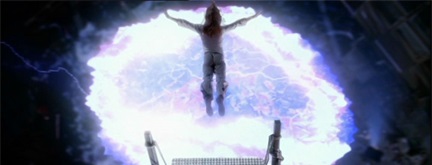
The Buffyverse contains its fair share of gods, lowercase. The series draws from various forms of mythology, showcasing Egyptian gods, a troll god named Olaf, and a goddess from a hell dimension named Glory. The show’s spin-off Angel also features gods in the form of Illyria and the Powers That Be. These gods, while extremely powerful, are able to be injured and even killed. Whedon seems content to draw on the Bible as another form of mythology. The Big Bad of Season Four, Adam, is a direct reference to the Garden of Eden story. Like the Biblical figure, Adam is a creation who seeks knowledge and understanding. (The murderous rampage he later engages on finds closer roots to Mary Shelley’s Frankenstein, which also draws from the Bible.) The consensus on capital “G” God in the Buffyverse, however, remains as ambiguous as it is in our world. such uncertainty is summarized in this conversation the titular character has with a vampire:
HOLDEN: Oh my god.
BUFFY: Oh your god what?
HOLDEN: Well, not MY god, ’cause I defy him and all his works – does he exist, by the way? Is there word on that?
BUFFY: Nothing solid.
From this exchange, it’s clear that Buffy isn’t a soapbox for Whedon’s own definitive thoughts on God. (Although the fact that Caleb, the misogynistic servant of the First Evil, is a preacher might not sit particularly well with Christian viewers.)
The character whose belief system actually aligns with Whedon’s is Angel, the ensouled vampire seeking redemption. In an Angel episode appropriately entitled “Epiphany,” the supernatural investigator comes to the following revelation: “If there’s no great glorious end to all this, if nothing we do matters … then all that matters is what we do. ‘Cause that’s all there is. What we do. Now. Today. I fought for so long, for redemption, for a reward, and finally just to beat the other guy. Because, if there’s no bigger meaning, then the smallest act of kindness is the greatest thing in the world.” This existential speech removes the idea of a higher purpose and leaves people in charge of their own actions. The statement radiates with humanistic ideals, placing emphasis not on a grand cosmic scheme, but on actions themselves. We are the ones responsible for creating meaning through the positive things we do. Can morals still exist without divinity guiding us? Both Angel and Whedon seem to think so.
Even after Angel’s revelation, the struggle to find meaning persists throughout the series. Constantly, characters on Angel contend with the purpose of life. Consider the exchange dethroned god Illyria has with Wesley Wyndham-Pryce in the Season 5 episode, “Shells”:
ILLYRIA: We cling to what is lost. Is there anything in this life but grief?
WESLEY: There’s love. There’s hope… for some. There’s hope that you’ll find something worthy… that your life will lead you to some joy… that after everything… you can still be surprised.
ILLYRIA: Is that enough? Is that enough to live on?
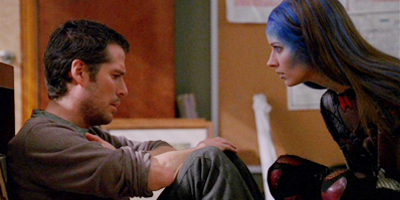
As a god, Illyria has trouble understanding the human experience. Wesley’s lack of response to Illyria’s last question demonstrates that he has just as much trouble articulating it. Some place their actions on the larger cosmic scale, hoping they will find joy with God once they transcend this earth. Others place meaning in love and others. Is faith enough to carry us through this life? Are people enough?
In spite of the Christian imagery evoked by Buffy’s cross necklace and Angel’s moniker, it’s actually Whedon’s later space western that directly tackles the notion of faith as a major theme. The dearly beloved (quickly cancelled) series Firefly begins its exploration of religion in the very first scene. During the Battle of Serenity Valley, protagonist Captain Malcolm Reynolds finds his comrades, the Browncoats, massacred by the opposing Alliance. With this, he loses his faith in God, averting the aphorism “There are no atheists in foxholes” in a literal sense. Malcolm (“Mal” for short) instead becomes a common Hollywood atheist archetype – the nonbeliever who’s angry at God. This becomes evident when he clashes with a new passenger on his ship, Shepherd Derrial Book. In one of their earlier interactions, Mal tells Book, “If I’m your mission, Shepherd, best give it up. You’re welcome on my boat. God ain’t.”
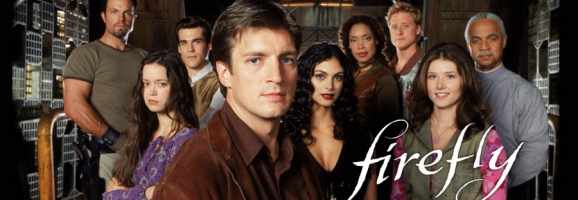
Although Firefly is set some 500 years into the future, Shepherd Book’s religion comes quite close to modern Christianity. With the Bible in hand, Book strictly abides to his faith, much to the chagrin and confusion of other crew members. Mal forbids him from saying grace aloud at the dinner table. The very blunt Jayne Cobb showcases a strong curiosity in the Shepherd’s sexual habits, or lack thereof. Finally, in the series’ most religiously-charged episode, “Jaynestown,” young psychic River Tam attempts to physically edit the fallacies in his Bible, leading to the following exchange:
RIVER: Bible’s broken. Contradictions, false logistics – doesn’t make sense.
BOOK: No, no. You- you- you can’t…
RIVER: So we’ll integrate non-progressional evolution theory with God’s creation of Eden. Eleven inherent metaphoric parallels already there. Eleven. Important number. Prime number. One goes into the house of eleven eleven times, but always comes out one. Noah’s ark is a problem.
BOOK: Really?
RIVER: We’ll have to call it early quantum state phenomenon. Only way to fit 5,000 species of mammal on the same boat.
BOOK: River, you don’t fix the Bible.
RIVER: It’s broken. It doesn’t make sense.
BOOK: It’s not about making sense. It’s about believing in something, and letting that belief be real enough to change your life. It’s about faith. You don’t fix faith, River. It fixes you.
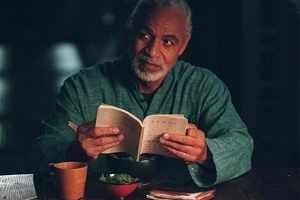
Interestingly, this definition of faith seems to fall away from a belief in the existence of God. Faith in this instance serves as a system propagated by humanity to cope. It’s not necessarily faith in God that heals and fixes but the concept of faith itself. This is supported by the A-plot of the same episode in which Jayne serves as the beloved “Hero of Canton” for a town. The townspeople celebrate Jayne for bestowing them with wealth, despite the true reasons for this act of kindness being a botched robbery. When Jayne’s former partner confronts him at gunpoint, ready to reveal the truth to the town, a young boy takes the bullet for his hero. The aftermath of this tragedy leaves Jayne disgusted with his deceptive actions, especially when the community continues to praise him. Mal reassures him, saying, “Ain’t about you, Jayne; it’s about what they need.” While the real Jayne may be a thief motivated by self-interest, the figure they celebrate persists as a beacon of hope. Jayne’s positive influence on these people overrides his desire to assuage his guilt by telling them the truth.
Book’s notion of faith itself as a source of power is cemented in the film, Serenity. In the face of impending danger, Book tells Mal about the importance of belief. Mal, still unable to reconcile with God, says, “Ah, hell, Shepherd, I ain’t looking for help from on high. That’s a long wait for a train don’t come.” Here, Book replies with a poignant line: “When I talk about belief, why do you always assume I’m talking about God?” Whedon’s humanistic viewpoint again comes through in this statement. Belief does not necessitate a higher power – it may simply refer to a belief in one’s fellow man. If we look back to Whedon’s Angel, it’s the simple fact that the protagonist believes in the rogue slayer Faith which drives her towards redemption.
Although Book represents the positive aspects of religion in his kindness, calmness of demeanor, and reasonable nature, Whedon makes sure to demonstrate the ill effects of faith as well. The episode “Safe” mirrors the Salem witch trials and showcases the cyclical nature of history. When a group of fundamentalist Christians attempts to burn River at the stake for her abilities, they quote Exodus 22:18 and shout, “Thou shalt not suffer a witch to live.” This community, deemed “The Hill Folk,” aims for a literal interpretation of the Bible rather than a symbolic one, as Book does. In their rigid adherence to religious law, they become short-term villains in the series.
From the futuristic setting of Firefly, Whedon moves into the futuristic technology of Dollhouse. The most obvious and direct reference to religion in the series occurs in the episode, “True Believer,” in which the protagonist Echo infiltrates a religious cult. The twist comes from the fact that Echo is unaware that she is doing undercover work for a federal agency – she is imprinted with the personality of a true believer and fully committed to the goals of the cult. The word “cult” already contains a stigma and the portrayal of the cult itself is played straight – they are fanatical and delusional, albeit to a lesser extent than the “Hill Folk” of Firefly. Such plotlines may hint at Whedon having an anti-religion bias. However, one may easily argue that such groups do exist and most religious people attempt to any association with them.
On a wider level, the whole premise of the series rests on humans gaining the Godlike power to erase identities and bestow a person with a new personality. Like God, lead programmer of the Dollhouse Topher Brink creates new people in his lab, deciding on their skills, quirks, flaws, interests, and dislikes. When Whiskey, a self-aware Doll that he programmed, confronts him, she sardonically says, “Aren’t you Big Brother? Aren’t you the Lord my God? Why should I fight your divine plan?” In her existential crisis, Whiskey gains the unique opportunity to actually approach her creator, who is simply a human. Topher tells her, “I made you a question. I made you fight for your beliefs. I didn’t make you hate me. You chose to.” Topher’s statement calls forth the notion of God granting humans free will. Whiskey, however, is unable to reconcile with this idea, questioning how much free will she truly has when she has been pre-programmed.
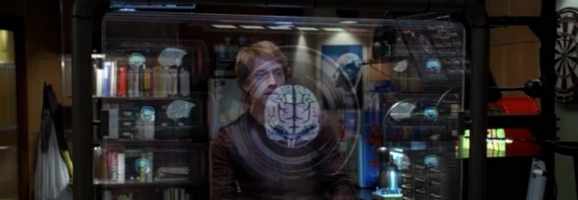
The steps leading to the ultimate downfall of a world with the Dollhouse’s technology are carefully placed. In the episode “Haunted,” head of the Dollhouse, Adelle DeWitt, transfers the complete identity of her deceased friend onto a living Doll. The sheer capacity of this technology is fully realized in the episode, showcasing its ability to grant life after death. Head of security Boyd Langton questions Adelle’s decision, saying, “You realize…that’s the beginning of the end. Life everlasting. It’s…it’s the ultimate quest. Christianity, most religion, morality doesn’t exist, without the fear of death.” Despite Whedon’s belief in humanity rather than God, Dollhouse clearly demonstrates the danger of human hubris. Are there limits to the power human beings should possess? As with any story about people playing God, the answer is yes.
The apocalyptic results of humanity holding such undeniable power become evident in the show’s Epitaph episodes, which jump forward years into the future. Members of the populace fight against the technology and struggle to retain their identities. Returning to the notion of faith as a healing fixture, Epitaph One features religious groups formed in the face of this utter chaos. They hide indoors in fear of the mind-wiping technology which looms outside. Surrounded by candles and followers, a man from this group says, “I’m humble in prayer. I am grateful for my memories.” Scenes like this demonstrate that Whedon understands the necessity of faith, even if he doesn’t belong to a particular denomination. Humanism also continues to reign true in the scene. The people in this group form a network of support for one another, much like the Scoobies of Buffy or the crew of Serenity.
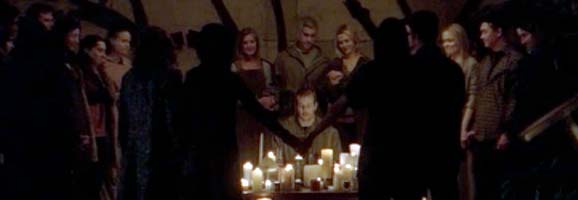
In a more recent interview with Entertainment Weekly, Joss Whedon expresses that he has no hope in the world as he sees it. However, he does make the following point:
My stories do have hope because that is one of the things that is part of the solution – if there can be one. We use stories to connect, to care about people, to care about a situation. To turn the mundane heroic, to make people really think about who they are. They’re useful. And they’re also useful to me. Because if I wrote what I really think, I would be so sad all the time. We create to fill a gap – not just to avoid the idea of dying, it’s to fill some particular gap in ourselves. So yeah, I write things where people will lay down their lives for each other. And on a personal level, I know many wonderful people who are spending their lives trying to help others, or who are just decent and kind. I have friends who are extraordinary, I love my family. But on a macro level, I don’t see that in the world. So I have a need to create it. Hopefully that need gets translated into somebody relating to it and feeling hope. Because if we take that away, then I’m definitely right. I want to be wrong more than anything.
In spite of Whedon’s lack of hope, he creates stories filled with it. Like Jayne to the people of Canton, the writer’s stories serve as symbols of hope for some. Could the same be said for God in his body of work? Although Whedon doesn’t believe in God, we can find faith permeating his shows, which lean towards agnosticism and humanism rather than atheism. Perhaps his need to write about God helps fill the gap he speaks of. Perhaps he simply returns to the subject because it’s worthy of discourse. “I think faith is an extraordinary thing,” the showrunner says. “I’d like to have some, but I don’t and that’s just how that works.” The stories Whedon tells demonstrate the first half of his statement rather than the latter half. Faith is shown in all its multitudes through his shows as well as the power of belief, for good and for worse. Whedon may be good without God but the Whedonverse, as an exploratory medium, is less quick to dismiss the notion of faith.
What do you think? Leave a comment.










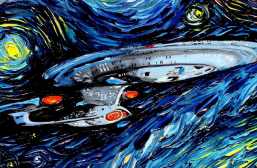
I love the idea that Whedon is seeking faith as a means of fueling one’s self. While I’m not entirely familiar with Doll House I definitely see where you are coming from with Buffy and Firefly.
I think something that would also be good to comment on is the role of faith and “belief” in Serenity. The idea that Malcolm needs to have something he strongly believes in to defeat his enemy.
Inara: “We have every reason to be afraid.”
Jayne: “Why, ’cause some guy beat up Mal? That ain’t so hard -”
Mal:”He didn’t beat me up -”
Inara: “Because he’s a believer. He’s intelligent, methodical and devout in his belief that killing River is the right thing to do.”
It hails to this idea that while, on one hand, faith can create something beautiful. It can also lead to something dangerous and destructive if someone believes enough. All in all, wonderful article and insight!
Glad you pointed that exchange out! I missed it but agreed. Firefly definitely shows both ends of the spectrum in regards to belief.
The question of good and evil in Buffy is not solved as simply as first appears. This is what I love about the show.
Definitely. Even though Angel deals more in grey areas of morality, we see with characters like Faith and Dark Willow that good and evil isn’t so simple. In “Who Are You?,” Faith had my sympathy when she revealed all her self-loathing. Plus, who didn’t cheer for Dark Willow flaying Warren, as brutal as that was?
GREAT writing. While these shows are highly entertaining and consumer driven, we are definitely still able to recognise the religious and spiritual themes and symbols that underlie them.
Thanks for reading! I love seeing these added layers upon re-watches.
Wonderful article Max. I’m still relatively new to the Whedonverse seeing as how I’ve only seen Firefly, but the other shows you mentioned sound terrific too. One thing that I was curious about in regards to Mal in Firefly was if somehow he didn’t want to rediscover the comfort his faith gave him when he had it, not by looking for it again but rather by looking to other people for a sense of closeness. Anyway, I’m just echoing a point that you mad that I thought was really good. Hope to see more of your work in the future 🙂
Thanks a lot! It’s a great point you bring up and you can definitely see with Mal’s loyalty towards his crew that he’s not completely jaded. Definitely check out the other shows if you have time. Hope the article didn’t spoil too much for you!
Get a firefly/serenity sequel happening.
A few years ago, Netflix did an April Fool’s prank where it claimed to have Firefly Season 2 streaming. I knew it was a joke, but it still hurt.
I might be the only one but aren’t Buffy and Smallville similar? I’m not comparing them and saying they are close in quality, but I do think there are some similarities. In the early seasons, you had a lot of soap stuff, but the character dynamics were very strong. In the later seasons, the character dynamics remained strong, but they really got the gist of an overarching plot down.
Buffy definitely made waves for TV shows in terms of Big Bads and seasonal arcs, so I’m not surprised even though I’ve never seen Smallville. You can see Buffy’s influence in shows like the new Doctor Who and Supernatural. By the way, do you happen to watch Arrow?
Well when Smallville first aired the Buffy writers were a little annoyed how Smallville was just using their same format for episodes. But after a couple of seasons Smallville figured out how to be themselves.
Smallville is the most uneven show I’ve ever watched. The seasons really are about 50-50. I enjoyed it for the most part. Then again, it might have helped that I didn’t watch it for ten years, I only watched for two years.
Before the 9th season began I decided I’d give the show a fair chance. Started watching and got hooked. Watched 8 seasons in about three months, and closely followed by season 9. Storylines that tended to get dragged out and become annoying, didn’t bother me that much, because it never felt like that for me. Something I discussed on IMDb as I watched and kept a thread open throughout my initial run. Made some new friends and found a new show I liked.
I just watched Dollhouse over the last two weeks because it is free on Amazon Prime, and I also think it is terrific. Watching an episode or two each day was my treat when I came home from work. It really deserved a longer run.
This is a series I didn’t even hear about when it was on. I wonder if part of this is that there are just so many shows on now that its hard for any program to get any traction before it gets cancelled. It also makes me wonder what else is out there that I’m missing.
I know that I’m grateful for a student of mine who told me To check put Orphan Black, another series I hadn’t heard of tht was great.
Both are excellent shows! Dollhouse was definitely cancelled too soon, although I love how the writers stomped on the pedal for Season 2’s plotlines as a result. Shameless self-promotion time. I happen to have written an article on these two shows a while back: https://the-artifice.com/identity-dollhouse-orphan-black/
I still watch Buffy in the mornings on FX. And watched Angel on TNT in the morning until they stopped running it not too long ago. Even though I’ve seen every episode many times over and they’re both on Netflix and Amazon Prime.
Something about catching a show/movie you love on air is magical, even when you have it on DVD/Netflix.
Not everyone liked ‘Epiphany’ but I thought it was magnificent, especially liked the Lindsey/Angel fight.
Same here! Whenever I see Joss’ name or Tim Minear’s on the writing credits for an Angel episode, I get excited.
I love your article, and I especially agree with the Dollhouse bit. The way Whedon plays around with Topher having a God-like complex is one of the more fascinating concepts on the show, and that scene (actually the whole arc) where Claire confronts him about is hand in her predicament is probably one of the best I’ve ever seen in television.
Yes! I’ve watched that scene so many times and I can’t get over its brilliance. Using an already unique concept to explore this idea of meeting your Creator. Amy Acker’s acting is fantastic in that scene.
What an excellent analysis! I’ve never considered Joss Whedon’s shows from a faith standpoint. It takes quite a writer/director to explore faith in such unique ways. You could even go so far as to analyze Dr. Horrible’s Sing Along Blog from Whedon’s complicated faith perspective. There’s a certain idea of faith in what it means to be a villain in that short film. Anyways, great article! Very in-depth and well-written!
Ooh, that would have been great to mention! I agree, Dr. Horrible has definitely changed his worldview by the end of that film and there’s a lot to explore there. Thank you for reading!
Dollhouse was a wonderful show and I miss it greatly. Shouldn’t have been cancelled.
FOX wants instant gratification and no ROI, which is why so many shows are canned before their time. “Instant” as a bazillion viewers from day 1, and not realizing that a loyal and dedicated niche audience can be just as lucrative. Anyone who says how niche audiences are bad is just trying to con people out of true freedoms…
But even if one doesn’t like the content (deception and amorality all; one can only feel sorry for the Dolls because of how they are being used – some won’t like that), at least the writing is nimble and original (while throwing in occasional pop culture references without getting OTT).
“Dollhouse” is another underrated classic – whether the “reality” garbage is more popular or because “reality” shows cost less to make than any show that requires WORK… (you know, drive down the value of work and then call people lazy because nobody wants to take the effort because people prefer the “good enough” “reality” garbage…)
I agree, this was a very interesting and entertaining show. I discovered it with my Netflix membership and couldn’t get enough of it, going to bed at ungodly hours a few nights in a row!
I haven’t seen (or heard of) some of these, but your post provides a sense of the shows’ nuances, and you certainly display competence in discerning the many subtexts embedded in the narrative – very interesting! I’ll browse through Netflix and see which of these are available for viewing.
If you’re in the U.S., then lucky for you – it’s all of them! 🙂
Although I haven’t seen all of the shows you mentioned, I never considered the underlying messages of the ones I am familiar with until I read this article.
Wonderful article. I’m a big Whedon fan, my favorites being Firefly, Dollhouse, and Much Ado About Nothing. I think your article poses some very interesting questions for Whedon as a writer. Many people refer to his atheist side, but never analyze the roots of that belief in his writing. Your article describes the fact that while he does keep away from the idea of God as a form of salvation and belief, he still adopts a humanistic mode of belief that transcends religion while retaining faith. I think this is the most vital point that you make in your article. Whedon may be an atheist, but he still retains a core faith in humanity. The distinction between faith and religion is important to make, because faith can transcend the bonds of religion. This is a fact that some people forget in their debates surrounding religion.
About half-way through reading your article, I got to wondering if you would mention Firefly… and you did. Kudos.
I recently finished dollhouse for the first time. I am now going back and watching Angel, after that I’m going to check out firefly for the second time because during my first viewing I didn’t understand what the hype was about…
This was really wonderful to read, both as a huge fan of Buffy and Firefly and as someone who minored in World Religions (but who wishes she majored in it!). I liked your analysis, and it was interesting to read about certain things I hadn’t considered or thought about with regard to religions in Joss work.
Firstly, I very much enjoyed this article. It is thought provoking and true to its subject matter. More to the point, as you alluded several times, Whedon is the ultimate humanist. Whether or not he sees it in the world at large, his stories and characters betray a belief in the capacity for man to be selfless and virtuous. While there may not be a belief in an omnipotent, omniscient, ultimate being, good and evil do exist in the Whedonverse.
I think the quarrel is less with God and more with zealotry and unchecked power. Whether it be Caleb, Wolfram and Hart, the Alliance or the Dollhouse, unchecked power and the dangers of kowtowing to some grand authority are common themes throughout the verse.
Whedon’s writing demonstrates a belief in secular morality and a questioning of authority. I would argue that is where the struggle lies. Given what we as westerners know of Gd, a man like Whedon would certainly struggle with belief. If you maintain morality can exist without religion and are suspicious of authority figures, it is natural to be agnostic or even atheist.
Joss Whedon is a very gifted writer, especially when it comes to dialogue. He has a nice creative quirk about him and a good sense of humor. He’s come a long way from when he started out on”Roseanne”…
Am I the only one that hated Buffy’s show but loved Angel’s?
I didnt hate Buffy, I enjoyed it. Prob one of my fav shows, but I really liked Angel’s show- which is also one of my fav. It was really great and quite darker a few times
I think Angel was more satisfying as a whole, but buffy had better, more progressive individual episodes (hush for instance).
Buffy and Angel are great shows. Never did catch up on those comic sequels, but I see it as killing off Fred (technically) and Wesley was what would ultimately happen anyway in Joss’ vision if the shows would have continued. And that is a poor ending imo.
It’s on Reddit, here:
http://www.reddit.com/r/buffy/comments/22k2cn/joss_whedon_god_in_the_whedonverse/
and here:
http://www.reddit.com/r/whedon/comments/22k15i/god_in_the_whedonverse_faith_hope_and_truth/
I’m an obsessive Buffy fan. I’ve re-watch all 144 episodes every summer. I think it is the best written show of all time.
Love this. And it inspired me to re-watch all of Buffy and Angel over the summer.
You did a great job of supporting all of your points! I also think it’s interesting that although Whedon doesn’t avoid the subject of faith and religion, he is seemingly hesitant to discuss God outright.
Another mentionable thing would be the Jasmine arc in Angel season 4 which is all about how people blindly follow religion
Interesting insight on his work. No matter what a person believes, God or gods will always be a part of story telling, and Whedon, whether or not he believes in one, does a good job of still exploring what others believe.
That’s probably the best part of his writing and you can definitely see that in his work on the Avengers in comparison to how the standalone movies were handled. Each character is given a moment to shine and they are all right in their own way. I think that’s the world we live in.
Great article! I know it wasn’t intentional since the show was cancelled so quickly, but I think it’s interesting that the last aired episode of Firefly, “Objects in Space,” ends with Jubal Early floating through space alone and resignedly saying, “Well, here I am,” in a way that kind of parallels the general attitude toward faith in the show’s main characters. None of them, not even Shepherd, ever really expresses a deep belief in God. In a way, this is kind of an admission that they are in fact drifting alone through space. On the other hand, they also seem to have a certain amount of faith in each other and that everything will eventually work out, even Simon and River, who arguably have the heaviest burden to bear. Early is certainly alone in the literal sense, but he doesn’t seem too bothered by it, implying some amount of certainty that he’ll be alright one way or another (whether this means he’s not afraid of death, hasn’t fully realized how much trouble he’s in yet, or has some faith that someone will be out there to pick him up is up for debate).
Fantastic article. That quote from Angel has also stuck with me. I’m glad someone else noticed it and appreciated it.
Strange that something so profound came out of the mouth of a fictional vampire from a low budget young adult TV show from the 90’s. Not so strange that it’s Joss :).
A fine piece of writing here.
I’m always interesting in watching for filmmakers that portray some aspect of faith, especially when it comes from someone who has a relationship with God, but doesn’t necessarily have faith in one.
It has little substance, but I love the exchange in “The Avengers” where Captain America remarks that “there’s only one God … and he doesn’t dress like that.”
That was definitely a great moment. I think that some people would consider that kind of thing to be “safe”, like a hint and a nod towards a christian demographic, but really I think it’s true for Captain America’s identity, someone who staunchly believes in the ideals of 1940’s Americanism.
These are some of my favorite tv shows. Joff is a genius.
Good write up. I really dug your voice in this article. It would be great to see what you would write in a situation in which you could go all out and not constrain your voice.
You definitely brought Whedon’s work into a new light for me. I had never considered the struggle of belief in his stories. I think that’s a problem many honest atheists try to tackle. While you can go to either extreme and say that there most definitely is a god who influences our lives or that there isn’t therefore the universe is uncaring, we still believe in either of these ideas. There’s some uncertainty in them. Until either a god proves himself without a doubt or the universe is found to be indifferent to us, humanity is stuck in the middle ground pondering.
And that’s definitely reflected in Whedon’s writing. We live in a world of varying beliefs, and no one person has be proven to be entirely right, which I think is a much more honest depiction of our world as opposed to the sterile-ness of something like Star Wars where there is no room for discrepancies. The Force definitely exists and the Sith/Dark Side are most definitely its enemies.
“The twist comes from the fact that Echo is unaware that she is doing undercover work for a federal agency – she is imprinted with the personality of a true believer and fully committed to the goals of the cult. The word “cult” already contains a stigma and the portrayal of the cult itself is played straight – they are fanatical and delusional, albeit to a lesser extent than the “Hill Folk” of Firefly. ”
Although Echo’s imprinted personality is religious, it’s really not fanatical or delusional, with most of the other members appearing essentially decent and sane under their religiosity as well; and the cult’s “goals” are basically to be left alone and live a simple lifestyle, with stockpiles of weapons only for protection. And when the leader starts losing it in the face of being surrounded by feds, almost all the others are on board with Echo in needing to get the heck out of Dodge. There are real-life cults that are a lot worse, like the one that that one woman alluding to leaving.
When your refer to ‘God’ are you referencing a specific theology for this critique? Also can’t the inclusion of contemporary religious elements be seen as the advanced development of secularism’s domestication of religion? Rather than positively expressing a notion of faith it seems to be revealing its ‘nothingness,’ especially, since it can so easily be worked into so many popular television series. It appears like a film set prop accuracy – the historical furnishings of social consciousness – would it be realistic of a writer to not reference Christendom’s enormous influence in shaping intellectual discussions within the humanities?
I thought this argument was really, really awesome thank you! Beautifully written and convincing arguments – on a topic that constantly fascinates me.
I enjoyed how Whedon handled the Shepherd in Firefly. It was not heavy-handed with the Christian message, but it worked with the plot and seemed a lot more even-handed than many caricatures of religious people in other TV shows and movies.
I think being a believer and being an atheist requires the same leap of faith. Being an atheist does not remove the question of faith and hope. I think those are human things that exist regardless of religion so it is completely natural to me that they are so present in the Whedonverse. Honestly I think it is one of the factors that makes his work appeal to me so much; there is a realism to how his characters approach life even when their actual situation in the story is not realistic (i.e. being space cowboys, fighting vampires, etc).
Wheaton definitely speaks on the subject of faith in away that is more introspective than expository, which is the reason why so much “faith-based” entertainment is so vanilla and bad. Leaving questions without answers is a much better way to dialogue on the subject than definite answers.
I would love to see you do a follow-up on this with Avengers as I think the very nature of superheroes and gods and monsters communicates the religious de-stability that Whedon plays with in earlier works. Excellent take!
Well written sir. I love the whedonverse and firefly holds a special place in my heart. What i find interesting, at least in regards to firefly and faith in god, is that we don’t truly know Malcolm before the war and what his opinions on god were once upon a time. To look at malcom reynolds, is to look at a man who believed that he was fighting for a just cause. That he was the plucky hero fighting an evil empire and that in the end good would prevail, till the battle of serenity valley. To be abandoned by the higher power of the Resistance who surrendered to the alliance, to see that all the death that he has inflicted and has suffered had been in vain, could cause a man to reject and hate god. He is a character i find very interesting. He rejects that there is a god but appears to hate the idea of him. I wonder if its possible that he simply feels abandoned and through his abandonment has turned his back to the idea of God because he believe God has acted in kind. i dont know the others well enough to speak on them.
I’ve never really thought this far about Whedon’s representation of God in his works, but this was a real thought-provoker. I particularly love the way he handles the question of God in Buffy the Vampire Slayer. There’s so much reference to religious notions because of the nature of the fiction, yet he manages to keep it thoughtful and questioning. The lack of definitive answers from the characters keeps the idea of ‘what is God’ open to interpretation. It’s a great way to keep the dialogue about faith vs religion open among viewers.
Very great and in depth look at Whedon’s work.
Joss’ show are easily my favorite because of the way he tells stories and develops characters. But he’s coming off as a hypocrite about this issue. One of the best quotes in Dollhouse comes from Topher in Epitaph One. He went mad because he saw his ideas help kill billions of people and almost destroy civilization. Looking back on it, he says “If I think I can figure things out, is that curiosity or arrogance?”
So when people ask where humans came from or ask what the purpose of life is, Joss is content to say he already has it figured out. Why? Why was it arrogant for Topher to think he could toy with human consciousness without getting anyone hurt yet it’s not arrogant for someone to assume they have reality figured out and rule out any other beliefs? Yes, it’s wrong for religious leaders to insist people blindly accept religious beliefs. But it’s also wrong for atheists to insist people accept atheist beliefs and rule out any theist explanation.
There’s so much we don’t understand about physics, biology and the origins of the universe that it seems pretty arrogant to ignore a whole category of possibilities.
Whedon is a genius and this makes me respect him even more so. Great read.
This is fantastic! I have never really thought about the role of religion in the Whedonverse (despite loving the Whedonverse). I’ve always been focused on the representation of gender, culture, and politics in his shows. It was extremely interesting reading about this aspect of his shows. Thank you for the great read!
A very interesting article. I connect with the analysis regarding Angel’s ‘quest’ you do really feel that Whedon really does struggle with these complicated questions. Bravo, on this thoughtful treatment!
It’s quite a display of talent to write such diverse characters and a wide spectrum of beliefs, isn’t it? Thank you for this analysis, you really put his complicated views on faith into perspective!
This is AWESOME. As an athiest myself, I take internal notes on mention of religion and God in tv shows, and this summed up the Whedonverse perfectly. I absolutely love the Angel quote. Might get that thrown up on a poster….
I too would like to hear your take on Whedon’s Avengers. In particularly on Captain America’s quote, “There’s only one God, ma’am, and I’m pretty sure he doesn’t dress like that.”
Buffy the Vampire Slayer explores so many unearthly issues, including the “God crisis”. Buffy is a teenager in search of herself, in search of a higher power, and in search of life’s meaning. She struggles to balance being a 16 year old and saving the world – every moment is a life-or-death struggle; it’s a metaphor for teen angst in itself. Both prom and graduation are correlated with an apocalypse. The show is genius – Whedon intertwines existential crises on a whole other level. I guess that’s why it’s my absolute favourite show of all time.
Great article! I enjoyed the read.
I appreciate both Whedon’s atheism and his analysis of faith in something. Too often those of us that are non-religious scoff at the flock, but it’s refreshing to see honest portrayals of those that cling to idols or relics in an effort to draw strength that doesn’t come across as preachy or stilted. I never noticed this aspect of the Whedonverse before this article!
Shepherd Book is probably the best example of how many Christians (or at least a couple people I know), react to people who either don’t believe or are unsure. Willing to enlighten them on what they believe while not forcing them to convert or condemning them for not believing.
I just watched the season 3 finale of SHIELD, “Ascension.” It’s an amazing episode that covers a lot of religious themes including faith and fate. The use of the necklace—seeing and following who bears it—is a brilliant plot device.
I don’t practice religion anymore, but I still found those final scenes onboard the Zephyr incredibly moving and profound. I wasn’t a huge fan of the first two seasons of SHIELD, but I’m glad that the network has backed this show long enough for this most recent season 3 arc.
I hope this renews discussion on Joss Whedon’s use of religion in his body of work.
A fascinating and insightful article! Top work dude!
As fast and loose as Buffy and Angel played with God and Christian concepts, I appreciate that they didn’t exactly vilify Judeo-Christian symbols of goodness – except for that misogynistic preacher, as you mentioned. But the church is made of fallible humans, and sometimes people use the church to justify their own sin. Not a big surprise there.
But unlike Supernatural or Lucifer, I don’t recall Buffy or Angel ever fighting representatives of Heaven, only hell. In fact (quick Wiki check) I don’t think any actual angels ever appeared on the show, only the comics.
As a Christian, I’m made a little uneasy when I see other shows make enemies out of God and his angels. Sure, Buffy and her gang made friends with demons, but the other side stayed good, albeit absent. That’s how Whedon kept the faith in his stories hopeful, rather than twisting it for the sake of a good story like other shows.
What do i think? good for Josh, but what works for him, doesnt work for me. Im a Buddhist and i dont care if others dont share my beliefs, I was just curious why firefly was a bit heavy on religion. Then again, i am watching it for the first time and i realize religion exists no matter where you go, or what you do, some of it is culture, and sometimes people have *experiences* some can call them hallucinations, delusions etc. but one mans delusion is another mans spiritual experience.
People dont become atheist to offend you sugar, they dont mock christianity to trigger you, snowflake. Some people just dont see Christianity as wholesome like you do, you pie eyed sheep.
Lovely article; I especially enjoyed Whedon’s quote about hope, the use of stories to connect with hope, the use of stories to change heroes, etc. I’ve never seen Buffy (I was a bit outside the target demographic when the show first came out). But this article makes me interested to check it out. I’d also be interested to see how writers think Buffy compares with shows like Joan of Arcadia or Touched by an Angel.
What do i think? good for Josh, but what works for him, doesnt work for me. Im a Buddhist and i dont care if others dont share my beliefs, I was just curious why firefly was a bit heavy on religion. Then again, i am watching it for the first time and i realize religion exists no matter where you go, or what you do, some of it is culture, and sometimes people have *experiences* some can call them hallucinations, delusions etc. but one mans delusion is another mans spiritual experience.